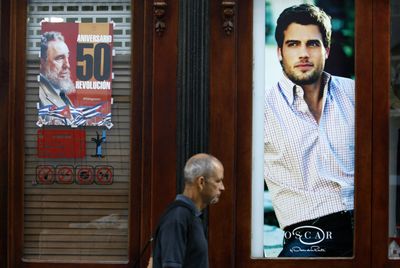Cuba observes muted 50th anniversary

SANTIAGO DE CUBA, Cuba – Scores of workers are laying cables while others hammer away at the wooden stage. Television crews are perched on an overhead church balcony practicing their standups. Men in military uniforms walk up and down the streets, finalizing the last details and inspecting rooftops.
No question – something big is afoot.
The 50th anniversary of the Cuban revolution will be celebrated here today with a 6 p.m. speech by Cuban leader Raul Castro before a plaza full of invited dignitaries. Preparations have been under way for weeks, and the rows of little blue plastic chairs have been up for days.
“The police have been going crazy with this thing for days,” a mechanic named Tony told the Miami Herald. “They are stopping everyone. It seems they are nervous about it.”
This is not just any New Year’s celebration in Cuba. It was 50 years ago today that a young lawyer-turned-rebel emerged from the jungle to declare victory in the nation’s civil war. Dictator Fulgencio Batista had fled – and the rebels who ousted him finally had their chance to upend the social order. Thousands of lives were lost.
The date is particularly important here in Santiago de Cuba, considered the “cradle of the revolution.” It was the spot Fidel Castro chose to launch his guerrilla war and where he first addressed mass rallies after victory.
In 1953, he led an attack on a military barracks here that failed miserably. The region’s Sierra Maestra mountains later served as cover for rebels who struck at trains, theaters and military outposts.
In a Jan. 3, 1959, address at the same plaza where festivities are planned, Castro promised freedom of speech and civil rights. He also accused Batista of running away with millions of dollars and promised to “do things that have never been done before.”
“Santiago de Cuba has been the strongest bulwark of the revolution, a revolution that is beginning now,” Castro said. “Our revolution will be no easy task, but a harsh and dangerous undertaking, particularly in the initial phases.”
This city on the southeastern tip of the island, Cuba’s second largest, was founded in 1514 and served as the capital of Cuba until 1553. It also served as a base of operations in the 1800s against the Spanish. Fiercely nationalist and known for its rebellious spirit, Santiago de Cuba has a larger population of Afro-Cubans, as it was here where many slaves from western Africa were brought.
Many residents are stocking up on food and booze. One man carried a case of Havana Club under each arm while ladies lugged huge bags of crackers. Long lines spill out of stores selling last-minute party supplies.
“With a stick and a can and a bottle of rum, we Cubans will have a good time, even when it seems the rest of the world is coming to an end,” said Josefina, a retiree. “Everywhere, at midnight, they raise the flag in the plaza. But this year there is a lot more excitement and more events planned. There’s a lot of need, so you won’t see a lot of lavish parties.”
Most Cubans said they planned to celebrate at home with family.
“Not too many people will go to the event at the park because, of course, that’s for special guests,” a lawyer named Ramon said sarcastically, raising his eyebrows when he referred to the special guests.
“Everyone else will be home with pigs roasting and rice and beans cooking,” Ramon said.
“There’s a lot of excitement in the air every year at this time, but this year is special.”
In Havana, meanwhile, with the revolution’s leader ailing and the economy in shambles, residents are preparing to mark the 50th anniversary of the revolution with low spirits and modest celebrations.
“There is no emotion,” said Marilyn, 40, a dance teacher. “We are lacking everything.”
“Two or three years ago people had more hope. Now they have no spark. This year has been very rough,” said Augusto, a taxi driver in his mid-30s who plans to celebrate the historic date drinking Bucanero, a popular local beer.
Beyond the economic hard times, Fidel Castro’s deteriorating health poses a huge obstacle to any investment in elaborate tributes.
“The government was concerned about planning a big party because of Fidel’s situation. It would not give the right message to have fun and spend lavishly under the circumstances,” said Juan, an intellectual from a prominent family.
In Havana, signs of celebration are muted. Some public employees wear white T-Shirts with the words “50th anniversary” in red on the front, a government gift.
Festivities and cultural activities related to the 50th anniversary have been ongoing since the beginning of the week. They range from the publication of a political review of socialist Cuba to a re-creation of the trip of the victorious Castro guerrillas from Santa Clara to Havana.
Food booths are set up around the Tribuna Antiimperialista, the park in front of the U.S. Interests Section. At the Plaza de la Revolucion, there will be events throughout the day.
The national TV channels plan wall-to-wall anniversary-related programming but some offerings geared to tourists do not mention the anniversary. The Santo Angel restaurant in Old Havana, for example, advertises a New Year’s Eve dinner for $80, featuring live music by performers from the Buena Vista Social Club.
The somber mood today is a far cry from Jan. 1, 1959.
“1959 was the most beautiful year in the world,” recalled writer Rafael Alcides. “People would greet each other on the street. There was the emotion of triumph. It was the thing we had dreamed of.”
“The rebels were gods,” he said. “People wanted to touch them.”
Little of that spirit is now evident.
“We felt protagonists of a just cause. Today you don’t believe,” said Alcides. “That’s the great difference today. When you believed, you did not mind dying.”